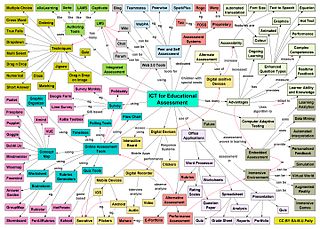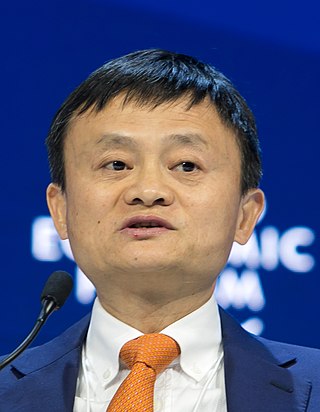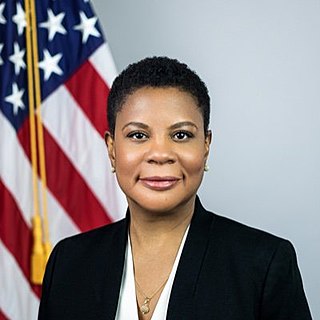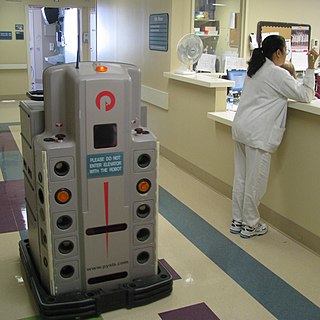Related Research Articles
The ethics of technology is a sub-field of ethics addressing the ethical questions specific to the Technology Age, the transitional shift in society wherein personal computers and subsequent devices provide for the quick and easy transfer of information. Technology ethics is the application of ethical thinking to the growing concerns of technology as new technologies continue to rise in prominence.
Technology governance means the governance, i.e., the steering between the different sectors—state, business, and NGOs—of the development of technology. It is the idea of governance within technology and its use, as well as the practices behind them. The concept is based on the notion of innovation and of techno-economic paradigm shifts according to the theories by scholars such as Joseph A. Schumpeter, Christopher Freeman, and Carlota Perez.

Information and communications technology (ICT) is an extensional term for information technology (IT) that stresses the role of unified communications and the integration of telecommunications and computers, as well as necessary enterprise software, middleware, storage and audiovisual, that enable users to access, store, transmit, understand and manipulate information.

Alibaba Group Holding Limited, or Alibaba, is a Chinese multinational technology company specializing in e-commerce, retail, Internet, and technology. Founded on 28 June 1999 in Hangzhou, Zhejiang, the company provides consumer-to-consumer (C2C), business-to-consumer (B2C), and business-to-business (B2B) sales services via Chinese and global marketplaces, as well as local consumer, digital media and entertainment, logistics and cloud computing services. It owns and operates a diverse portfolio of companies around the world in numerous business sectors.

Jack Ma Yun is a Chinese business magnate, investor and philanthropist. He is the co-founder of Alibaba Group, a multinational technology conglomerate. In addition, Ma is also the co-founder of Yunfeng Capital, a Chinese private equity firm. As of June 2023, with a net worth of $34.5 billion, Ma is the fourth-wealthiest person in China, as well as the 39th wealthiest person in the world, ranked by Bloomberg Billionaires Index.

Social entrepreneurship is an approach by individuals, groups, start-up companies or entrepreneurs, in which they develop, fund and implement solutions to social, cultural, or environmental issues. This concept may be applied to a wide range of organizations, which vary in size, aims, and beliefs. For-profit entrepreneurs typically measure performance using business metrics like profit, revenues and increases in stock prices. Social entrepreneurs, however, are either non-profits, or they blend for-profit goals with generating a positive "return to society". Therefore, they use different metrics. Social entrepreneurship typically attempts to further broad social, cultural and environmental goals often associated with the voluntary sector in areas such as poverty alleviation, health care and community development.
Digital literacy is an individual's ability to find, evaluate, and communicate information by utilizing typing or digital media platforms. It is a combination of both technical and cognitive abilities in using information and communication technologies to create, evaluate, and share information.

Alex Paul "Sandy" Pentland is an American computer scientist, the Toshiba Professor of Media Arts and Sciences at MIT, and serial entrepreneur.

The World Academy of Art and Science (WAAS), founded in 1960, is an international non-governmental scientific organization and global network of more than 800 scientists, artists, and scholars in more than 90 countries.

Alondra Nelson is an American academic, policy advisor, non-profit administrator, and writer. She is the Harold F. Linder chair and professor in the School of Social Science at the Institute for Advanced Study, an independent research center in Princeton, New Jersey. From 2021 to 2023, Nelson was deputy assistant to President Joe Biden and principal deputy director for science and society of the White House Office of Science and Technology Policy (OSTP), where she performed the duties of the director from February to October 2022. She was the first African American and first woman of color to lead OSTP. Prior to her role in the Biden Administration, she served for four years as president and CEO of the Social Science Research Council, an independent, nonpartisan international nonprofit organization. Nelson was previously professor of sociology at Columbia University, where she served as the inaugural Dean of Social Science, as well as director of the Institute for Research on Women and Gender. She began her academic career on the faculty of Yale University.

Andrew Yan-Tak Ng is a British-American computer scientist and technology entrepreneur focusing on machine learning and artificial intelligence (AI). Ng was a cofounder and head of Google Brain and was the former Chief Scientist at Baidu, building the company's Artificial Intelligence Group into a team of several thousand people.

Genevieve Bell is an Australian cultural anthropologist, best known for her work at the intersection of cultural practice research and technological development, and for being an industry pioneer of the user experience field. Bell was the inaugural director of the Autonomy, Agency and Assurance Innovation Institute (3Ai), which was co-founded by the Australian National University (ANU) and CSIRO’s Data61, and a Distinguished Professor of the ANU College of Engineering and Computer Science. In 2021, she became Director of the new ANU School of Cybernetics. She also holds the university's Florence Violet McKenzie Chair, and is the first SRI International Engelbart Distinguished Fellow. Bell is also a Senior Fellow and Vice President at Intel. She is widely published, and holds 13 patents.

Technology society and life or technology and culture refers to the inter-dependency, co-dependence, co-influence, and co-production of technology and society upon one another. Evidence for this synergy has been found since humanity first started using simple tools. The inter-relationship has continued as modern technologies such as the printing press and computers have helped shape society. The first scientific approach to this relationship occurred with the development of tektology, the "science of organization", in early twentieth century Imperial Russia. In modern academia, the interdisciplinary study of the mutual impacts of science, technology, and society, is called science and technology studies.

Technological unemployment is the loss of jobs caused by technological change. It is a key type of structural unemployment. Technological change typically includes the introduction of labour-saving "mechanical-muscle" machines or more efficient "mechanical-mind" processes (automation), and humans' role in these processes are minimized. Just as horses were gradually made obsolete as transport by the automobile and as labourer by the tractor, humans' jobs have also been affected throughout modern history. Historical examples include artisan weavers reduced to poverty after the introduction of mechanized looms. During World War II, Alan Turing's Bombe machine compressed and decoded thousands of man-years worth of encrypted data in a matter of hours. A contemporary example of technological unemployment is the displacement of retail cashiers by self-service tills and cashierless stores.
Machine ethics is a part of the ethics of artificial intelligence concerned with adding or ensuring moral behaviors of man-made machines that use artificial intelligence, otherwise known as artificial intelligent agents. Machine ethics differs from other ethical fields related to engineering and technology. Machine ethics should not be confused with computer ethics, which focuses on human use of computers. It should also be distinguished from the philosophy of technology, which concerns itself with the grander social effects of technology.

Mustafa Suleyman is a British artificial intelligence researcher and entrepreneur who is the co-founder and former head of applied AI at DeepMind, an artificial intelligence company acquired by Google and now owned by Alphabet. His current venture is Inflection AI.

Mary-Anne Williams FTSE is the Michael J Crouch Chair for Innovation at the University of New South Wales in Sydney Australia (UNSW) based in the UNSW Business School.
The artificial intelligence (AI) industry in China is a rapidly developing multi-billion dollar industry. As of 2021, the artificial intelligence market is worth about RMB 150 billion, and is projected to reach RMB 400 billion by 2025. The roots of China's AI development started in the late 1970s following economic reforms emphasizing science and technology as the country's primary productive force.
The regulation of artificial intelligence is the development of public sector policies and laws for promoting and regulating artificial intelligence (AI); it is therefore related to the broader regulation of algorithms. The regulatory and policy landscape for AI is an emerging issue in jurisdictions globally, including in the European Union and in supra-national bodies like the IEEE, OECD and others. Since 2016, a wave of AI ethics guidelines have been published in order to maintain social control over the technology. Regulation is considered necessary to both encourage AI and manage associated risks. In addition to regulation, AI-deploying organizations need to play a central role in creating and deploying trustworthy AI in line with the principles of trustworthy AI, and take accountability to mitigate the risks. Regulation of AI through mechanisms such as review boards can also be seen as social means to approach the AI control problem.

Global Goals Week is a shared commitment between a coalition of over 160 partners across all industries, which mobilizes annually in September to bring together communities, demand urgency, and supercharge solutions for the Sustainable Development Goals (SDGs). It was founded in 2016 by the United Nations Foundation, Project Everyone, and the United Nations Development Programme (UNDP). It is timed to coincide with the UN General Assembly "High-Level Week" in New York. The week includes events, summits, conferences, forums, workshops, pledges, and other activations in New York, around the world, and online. It usually runs alongside Climate Week NYC, the annual conference of Goalkeepers, Bloomberg Global Business Forum and many other high-level events.